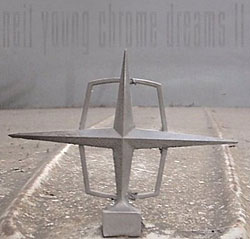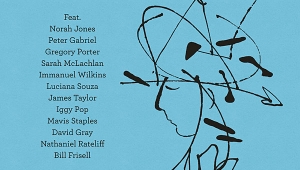| Columns Retired Columns & Blogs |
Recording of January 2008: Chrome Dreams II
NEIL YOUNG: Chrome Dreams II
Reprise 311932-2 (CD). 2007. Neil Young, prod.; Niko Bolas, prod., eng.; John Hausmann, Rob Clark, Brent Walton, Tim McColm, Colin Suzuki, asst. engs. AAD? TT: 66:17
Performance ****
Sonics ****
Reprise 311932-2 (CD). 2007. Neil Young, prod.; Niko Bolas, prod., eng.; John Hausmann, Rob Clark, Brent Walton, Tim McColm, Colin Suzuki, asst. engs. AAD? TT: 66:17
Performance ****
Sonics ****
Never has the in-vogue term perfect storm been better applied than to Neil Young's wonderful Chrome Dreams II, which is sure to be tagged with another worn adage: "late-period masterpiece." Here several streams of events personal and public have coalesced to make this Young's most tuneful and together mix of his pre-set songwriting modes in quite some time. That it's cohesive is surprising considering that three of the songs are nearly 20 years old.
 The title, Chrome Dreams II, is a tribute to or goof on Young's unreleased 1977 album Chrome Dreams, which, like all shelved projects, immediately became the subject of grail-like quests by Young geeks and a best-selling bootleg. Another colliding element in this collecting gail is the nearly fatal brain aneurysm Young suffered in New York City in 2005. Having nearly died seems to have given him new energies for his music.
The title, Chrome Dreams II, is a tribute to or goof on Young's unreleased 1977 album Chrome Dreams, which, like all shelved projects, immediately became the subject of grail-like quests by Young geeks and a best-selling bootleg. Another colliding element in this collecting gail is the nearly fatal brain aneurysm Young suffered in New York City in 2005. Having nearly died seems to have given him new energies for his music.
It was also high time that Young—who, at 61, remains a remarkably vital artist—released a solid album. Given the stylistic tick-tock of his most recent projects—tick (slight) for Greendale, Living With War, Are You Passionate?, tock (better) for Prairie Wind—he was due.
Finally, within that motion, the two sides of Young's musical personality—guitar-wanging, Crazy Horse feedback junkie, and gentle, rustic folky—seemed bound to eventually inhabit a single album. If nothing else, Chrome Dreams II gives lovers and haters of each side of Young's musical persona plenty of ammunition to fuel their respective passions.
The album's stylistic cleavage is best summed up in the jarring juxtaposition of the scuzzy, loud and lowdown "Dirty Old Man," in which the protagonist is proud to bleat, "I like to get hammered / on Friday night / Sometimes I can't wait / So Monday's alright"; to the rolling pedal steel guitars and revelatory gleam of the earnest "Ever After": "I love the sound of laughter / And music in the air / And in the Ever After / I know it's always there."
Those two styles, rocker and hick, find even fuller expression in two songs that define what Young haters and lovers feel passionate about. The opener, "Beautiful Bluebird," is one of Young's simple, affecting melodies in the "Only Love Can Break Your Heart" mode, albeit not as tender or as sure. Sung not in Young's Crazy Horse growl but in his plaintive, quavery style, "Bluebird" was written in the mid-1980s, but never recorded or released until now. It's exactly the kind of tune that those who revile Young's pretty, countrified side love to despise. To others, it's a perfect example of the kind of fine melody and sweetly barbed hook that have always made his ballads something very special, and an essential balance to his "Like a Hurricane" urges to RAWK.
On the other side—that moonscape of electric squall that, thankfully, Young still needs—is what is maybe his greatest musical sprawl (though "Sugar Mountain" also comes to mind): the +18-minute, guitar-solo–stuffed "Ordinary People." An unreleased recording from around the time of This Note's for You (1988) whose sound is more than satisfactory, this is Young at his topical, populist, angry best. Set to Crazy Horse–style fuzz-guitar menace—and horns—the song's 17 verses are populated by "vigilante people, alcoholic people, and patch of ground people," not to mention mentions of "Rolls-Royce," "Michelob night" and "Lee Iacocca people." Guitar and horn solos fill in most of the rest of the space. It's a shock that this monster has stayed under official wraps for so long.
Young's fellow travelers here are the usual suspects, including Crazy Horse drummer Ralph Molina, pedal steel player Ben Keith (who first appeared on 1972's Harvest), and bassist Rick Rosas (who first joined Young in 1988 as part of the Bluenotes); all play with their usual cool professionalism. The sound is reassuringly warm and natural, though at times Young's voice can sink back into the mix, especially on the loud, guitary numbers.
Whatever your feelings about either of Young's stylistic personalities, the combination of both on one record is brilliant. What's most undeniably impressive about Chrome Dreams II is the proof it offers that Neil Young is one of the few rock musicians of his generation who has not only survived, but thrives.—Robert Baird
- Log in or register to post comments




































